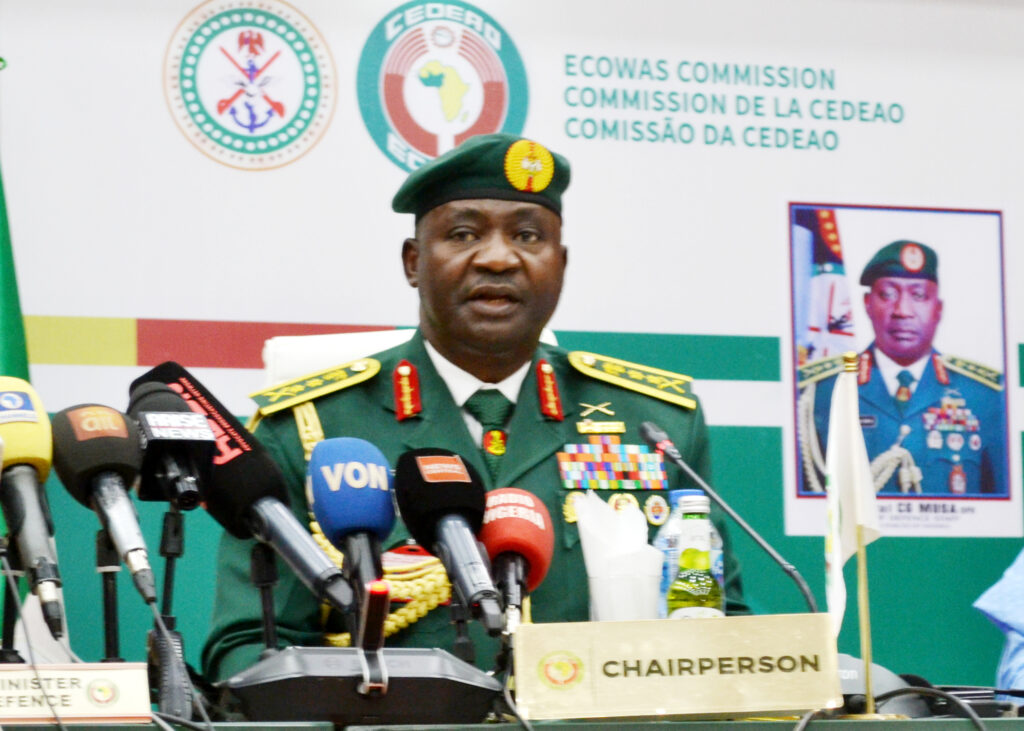Between July 10, 2023 and December 9, 2024, a total of 129,417 Boko Haram terrorists and their family members have surrendered to government security forces in Nigeria.
The Chief of Defence Staff, General Christopher Musa, revealed the figure of the arrested terrorists during the ongoing 18th Africa Security Watch Conference in Doha, Qatar.
According to him, the figure, which comprises 30,426 fighters, 36,774 women, and 62,265 children, has further underscored the progress towards an increasingly peaceful society that promotes socio-economic development in Nigeria.
Themed “Developing Modules for People-Centric Governance Towards Enhancement of Peace and Security,” the conference, organised by Mr Patrick Agbambu of Security Watch Africa Initiative, drew participants from Nigeria, Guinea Bissau, The Gambia, South Africa, Kenya, and Qatar.
General Musa, in his presentation on “The Nexus Between Citizen’s Socio-Economic Development and National Defence,” attributed the surge in terrorist surrenders to the Armed Forces’ effective integration of kinetic and non-kinetic approaches.
He noted that this strategy has not only stabilised communities but also created an environment conducive to socio-economic progress.
“The increasingly frequent surrenders signify the fruitful impact of our comprehensive approach,” said General Musa. “We have made significant progress in fostering a peaceful society that guarantees improved socio-economic conditions for our citizens. While challenges remain, we are not where we were as of June 2023.”
General Musa highlighted the Armed Forces’ contributions to socio-economic development, such as boosting daily oil production, reducing attacks on vulnerable communities, and enhancing stability through innovative operational strategies.
These achievements, he explained, stem from a recalibration of tactics, techniques, and procedures, ensuring that both kinetic operations and people-centred initiatives work in tandem.
In his remarks, Vice Admiral Awwal Zubairu Gambo (Rtd), the immediate past Chief of Naval Staff, spoke on “Leadership as an Agent of Positive Change in Security,” emphasising the critical role of purposeful and compassionate leadership.
“A leader driven by a genuine sense of purpose fosters trust and inspires personnel to see the broader impact of their daily actions on peace and security,” he stated.
Highlighting his tenure in the Nigerian Navy, Gambo said his focus on personnel welfare and collective strength under the motto ‘Onward Together’ yielded transformative results in naval operations and contributed significantly to national security.
Major General Adamu Laka, National Coordinator of the National Counter-Terrorism Centre, provided an overview of Nigeria’s counter-terrorism efforts in his presentation, “The Trajectory of Counter-Terrorism Fight: The Nigerian Experience”, in which he revealed that the prosecution of terrorists has advanced, with five phases of trials yielding 505 convictions, while the sixth phase is currently underway.
In the lecture, which was delivered by Brigadier General SK Usman (Rtd), he described the country’s journey as one of resilience, adaptation, and significant progress amidst persistent challenges.
General Laka pointed to key military successes, such as reclaiming territories previously controlled by Boko Haram and ISWAP, the neutralisation of high-profile insurgent leaders like Abubakar Shekau, and the increasing rate of surrenders under Operation HADIN KAI.
He also lauded regional collaboration through the Multinational Joint Task Force (MNJTF), which has disrupted insurgent activities in the Lake Chad Basin, as well as legislative reforms like the Terrorism Prevention and Prohibition Act 2022, which provides a robust framework for prosecuting terrorists and disrupting their financial networks.
He also highlighted Nigeria’s strides in deradicalisation and rehabilitation programmes, particularly through Operation SAFE CORRIDOR, adding that these initiatives, alongside community resilience programmes and public awareness campaigns, have empowered local populations to resist extremist ideologies.
Efforts to counter terrorism financing, including the establishment of a Joint Investigation Committee under the National Counter-Terrorism Centre, were also spotlighted as Nigeria edges closer to exiting the FATF Grey List.
Also speaking, the Convener and President of Africa Security Watch Initiative, Mr. Patrick Agbambu, said the conference underscored the intricate relationship between national defence and socio-economic development.
While reaffirming the necessity of a multi-pronged approach to combat insecurity, he said as Africa continues to adapt and refine its strategies, the continent moves closer to achieving a lasting peace that fosters economic growth and social stability.
In his keynote address, Senator Douye Diri, Governor of Bayelsa State, emphasized his administration’s commitment to people-centric governance, prioritizing peace, security, and prosperity for all Bayelsans.
He highlighted the ASSURED Prosperity agenda, a seven-pillar development strategy focusing on key areas such as agriculture, security, sports, urban renewal, healthcare, energy, and education.
The ASSURED Prosperity agenda aims to unlock new economic growth and job creation opportunities, enhance security measures, and promote peace and harmony. Senator Diri emphasized that people-centric governance is a dynamic approach that requires adaptability and responsiveness to the needs of the people.
By implementing the ASSURED Prosperity agenda, Senator Diri’s administration seeks to drive industrialisation, economic progress, and sustainable development in Bayelsa State. The goal is to ensure that all Bayelsans benefit from the state’s resources and opportunities.

